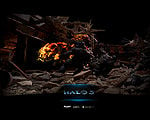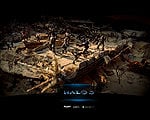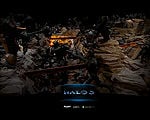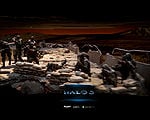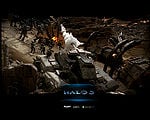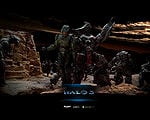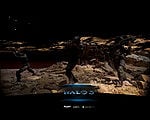Second Battle of Mombasa: Difference between revisions
From Halopedia, the Halo wiki
PatrickRus (talk | contribs) No edit summary |
Sith Venator (talk | contribs) (I'm not sure what we're going to do with this page.) |
||
| Line 1: | Line 1: | ||
{{Era|HCW}} | {{Era|HCW}} | ||
{{Newcontent}} | {{Newcontent}} | ||
{{battle | {{battle | ||
|prev= | |prev= | ||
| Line 68: | Line 67: | ||
==Production notes== | ==Production notes== | ||
The Second Battle of Mombasa was portrayed in the | The Second Battle of Mombasa was portrayed in the ''[[Believe]]'' advertising campaign created by [[Microsoft Studios]] to promote ''Halo 3''. The game and subsequent media establish that John-117 never returned to Mombasa; instead, the distant city of [[Voi]] (around 140 kilometers northwest) serves as the primary battleground for control of [[the Portal]]. The fate of New Mombasa as depicted in the diorama was also later contradicted: ''Halo 3: ODST'' reveals that the city sustained rather minor damage during Regret's escape and was glassed hours later, and that a protracted battle never occurred in the city's ruins. However, the [[Museum of Humanity]] has since been canonized in the ''[[Halo: Reach Limited Edition|Limited]]'' and ''[[Halo: Reach Legendary Edition|Legendary Editions]]'' of ''[[Halo: Reach]]''. This may imply that the Second Battle of Mombasa was made as a coverup story by the [[Office of Naval Intelligence]] to hide the discovy of the [[Portal at Voi]], and consecutive [[Battle of Installation 00]] from the civilians. | ||
==Gallery== | ==Gallery== | ||
Revision as of 15:13, April 7, 2015
Template:Newcontent Template:Battle
The Second Battle of Mombasa was a bloody seven-day engagement between the United Nations Space Command and the Covenant in the ruins of the city of New Mombasa, Kenya, on Earth in November 2552. It took place in the weeks immediately after the Prophet of Regret's retreat to Halo Installation 05, lasting until Spartan John 117's return to Earth aboard the Prophet of Truth's Forerunner Dreadnought. The battle is depicted by the John-117 Monument in the Museum of Humanity, completed in 2610.[1]
Background
On October 20, 2552, the Prophet of Regret, having suffered heavy casualties during his forces' invasion of Mombasa, entered slipspace from within the city, unleashing a powerful explosion that caused great damage - heavy enough to sever the city's space tether, causing its catastrophic collapse onto the surrounding savanna. The remaining Covenant and UNSC ground forces surged forward into the city to secure whatever tactical advantage the ruins might have held. Elements from the 77th Marine Regiment and the 506th Tank Regiment battled furiously for the ruins, with snipers from both sides taking a heavy toll upon the enemy. After seven days of battle, the Marines were nearly beaten; however, John-117's arrival turned the tide in the UNSC's favor.
Timeline
Battle for the landing zone
The battle began on the outskirts of New Mombasa, where UNSC and Covenant forces engaged each other in a bitter fight for control of a landing zone. The UNSC never gained full control of it, always being pushed back by the Covenant whenever they seemed to secure it and vice versa.
The northern bridge falls
Despite a valiant defense by the Marines, they had no means to hold the bridge to the north. With Jiralhanae forces surging over it and hitting the Marines' vulnerable flanks, there was only one option remaining. At 14:00, the order came through to destroy the bridge, thus forcing the enemy down into the valley where UNSC trenches lay to slaughter the enemy with fire from elevated positions. However, this was not the case as the Covenant forces had already begun to surge down the trenches with the destruction of the bridge.
The hill
The defense of the hill was the most ferocious and bloody engagement of the battle; two thirds of the defending UNSC forces became casualties at this bottleneck. After the second bridge was destroyed, the trenches at the foot of the hill, despite a last-ditch defensive measure, came under heavy attack, garnering heavy Marine casualties.
Snipers
Snipers from both sides battled for control, with UNSC snipers fighting on one end of the destroyed southern bridge and Covenant Kig-Yar Snipers halting Marines outside the landing zone before being routed by UNSC infantry and tanks.
The 506th arrive
Tasked with securing a road to the southern bridge span, the 506th Tank Regiment plowed forward, taking heavy casualties. Though outnumbered, they took their objective, leaving a path for the second wave of Marine infantry to follow.
John-117's gambit
At the top of the "hill" bottleneck, SPARTAN John-117 launched a gambit to retake the hill for the UNSC forces, by allowing himself to be captured by Jiralhanae forces there. As he was being held aloft by the Jiralhanae Chieftain in command of the attacking forces, John ignited a plasma grenade. This presumably killed the chieftain, but also led to the belief that the Spartan had been killed; decades later, Marine survivors of the battle maintained that John had been killed.
Notable UNSC combatants
The following are UNSC servicemen who are featured notably in the John-117 Monument. Some of the survivors of the battle were interviewed during the filming of the Believe documentary, which details the battle and the sacrifice of John-117.
- Pawel Czernek- Now-Major Pawel Czernek was active for thirty years in the UNSC from 2551 to 2581. By 2610 he is one of the few living survivors of the battle and Museum of Humanity. In the Believe documentary, he related his role in the battle, and that of John-117, while examining a diorama of the battle, part of which depicts his story.[2]
- Ian Callahan- Callahan was captured by Kig-Yar during the battle. As he was about to be killed, he was rescued by fellow Marine whose face he never saw.[2]
- James Dessen- Corporal James Dessen was posthumously awarded the UNSC Legion of Honor for his extraordinary bravery during the battle.[1]
- Thomas P. Porter- Porter served as M808B Scorpion tank driver during the battle. In the Believe documentary, he discussed the experience of driving a tank during combat.[1]
- Thomas Chang- Sergeant Chang was a veteran of numerous battles with the Covenant, including the Battle of Installation 04, and successfully completed the task of securing a forward headquarters during the battle. He was killed during a Covenant air assault.[1]
- Jackson Law- Law was the sole survivor of a Warthog patrol during the battle. He sustained serious injuries when his Warthog was destroyed by Covenant plasma bombardment, which he describe in the documentary.[1]
- Sian Wong- Wong served as a sniper during the battle. Sustained severe burn injuries from a retaliatory Banshee strike, which he discussed in the documentary.[1]
- Russel Tinnier- Tinnier was assigned to the destroy the bridge, which proved critical in the early stages of the battle. He described the experience in Believe.[1]
- Thomas C. Meyer- Meyer used his rocket launcher to destroy the bridge alongside Tinnier. He was also interviewed for the documentary.[1]
- Emmanuel "Emmet" Lomax- "Emmet" Lomax encountered SPARTAN John-117 after receiving four hours of sleep in a derelict building. He described the experience for the documentary.[1]
- Caio Zanato- Zanato was the sole survivor of his squad; He was then promoted to the rank of Private First Class, though he stated, "I got the job because I was the only one in my squad still alive." He was widely renowned for his driving ability.[1]
- Niraj Shah - Shah was a sniper during the battle on the hill. During the filming of the Believe documentary, he guided the film crew around the spot where John-117 was allegedly killed.[1]
Production notes
The Second Battle of Mombasa was portrayed in the Believe advertising campaign created by Microsoft Studios to promote Halo 3. The game and subsequent media establish that John-117 never returned to Mombasa; instead, the distant city of Voi (around 140 kilometers northwest) serves as the primary battleground for control of the Portal. The fate of New Mombasa as depicted in the diorama was also later contradicted: Halo 3: ODST reveals that the city sustained rather minor damage during Regret's escape and was glassed hours later, and that a protracted battle never occurred in the city's ruins. However, the Museum of Humanity has since been canonized in the Limited and Legendary Editions of Halo: Reach. This may imply that the Second Battle of Mombasa was made as a coverup story by the Office of Naval Intelligence to hide the discovy of the Portal at Voi, and consecutive Battle of Installation 00 from the civilians.
Gallery
Sources
